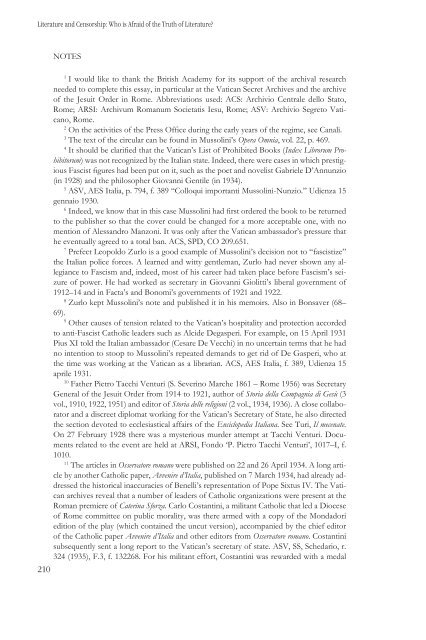Literatura in cenzura - Društvo za primerjalno književnost - ZRC SAZU
Literatura in cenzura - Društvo za primerjalno književnost - ZRC SAZU
Literatura in cenzura - Društvo za primerjalno književnost - ZRC SAZU
- No tags were found...
Create successful ePaper yourself
Turn your PDF publications into a flip-book with our unique Google optimized e-Paper software.
Literature and Censorship: Who is Afraid of the Truth of Literature?210NOTES1I would like to thank the British Academy for its support of the archival researchneeded to complete this essay, <strong>in</strong> particular at the Vatican Secret Archives and the archiveof the Jesuit Order <strong>in</strong> Rome. Abbreviations used: ACS: Archivio Centrale dello Stato,Rome; ARSI: Archivum Romanum Societatis Iesu, Rome; ASV: Archivio Segreto Vaticano,Rome.2On the activities of the Press Office dur<strong>in</strong>g the early years of the regime, see Canali.3The text of the circular can be found <strong>in</strong> Mussol<strong>in</strong>i’s Opera Omnia, vol. 22, p. 469.4It should be clarified that the Vatican’s List of Prohibited Books (Index Librorum Prohibitorum)was not recognized by the Italian state. Indeed, there were cases <strong>in</strong> which prestigiousFascist figures had been put on it, such as the poet and novelist Gabriele D’Annunzio(<strong>in</strong> 1928) and the philosopher Giovanni Gentile (<strong>in</strong> 1934).5ASV, AES Italia, p. 794, f. 389 “Colloqui importanti Mussol<strong>in</strong>i-Nunzio.” Udien<strong>za</strong> 15gennaio 1930.6Indeed, we know that <strong>in</strong> this case Mussol<strong>in</strong>i had first ordered the book to be returnedto the publisher so that the cover could be changed for a more acceptable one, with nomention of Alessandro Manzoni. It was only after the Vatican ambassador’s pressure thathe eventually agreed to a total ban. ACS, SPD, CO 209.651.7Prefect Leopoldo Zurlo is a good example of Mussol<strong>in</strong>i’s decision not to “fascistize”the Italian police forces. A learned and witty gentleman, Zurlo had never shown any allegianceto Fascism and, <strong>in</strong>deed, most of his career had taken place before Fascism’s seizureof power. He had worked as secretary <strong>in</strong> Giovanni Giolitti’s liberal government of1912–14 and <strong>in</strong> Facta’s and Bonomi’s governments of 1921 and 1922.8Zurlo kept Mussol<strong>in</strong>i’s note and published it <strong>in</strong> his memoirs. Also <strong>in</strong> Bonsaver (68–69).9Other causes of tension related to the Vatican’s hospitality and protection accordedto anti-Fascist Catholic leaders such as Alcide Degasperi. For example, on 15 April 1931Pius XI told the Italian ambassador (Cesare De Vecchi) <strong>in</strong> no uncerta<strong>in</strong> terms that he hadno <strong>in</strong>tention to stoop to Mussol<strong>in</strong>i’s repeated demands to get rid of De Gasperi, who atthe time was work<strong>in</strong>g at the Vatican as a librarian. ACS, AES Italia, f. 389, Udien<strong>za</strong> 15aprile 1931.10Father Pietro Tacchi Venturi (S. Sever<strong>in</strong>o Marche 1861 – Rome 1956) was SecretaryGeneral of the Jesuit Order from 1914 to 1921, author of Storia della Compagnia di Gesù (3vol., 1910, 1922, 1951) and editor of Storia delle religioni (2 vol., 1934, 1936). A close collaboratorand a discreet diplomat work<strong>in</strong>g for the Vatican’s Secretary of State, he also directedthe section devoted to ecclesiastical affairs of the Enciclopedia Italiana. See Turi, Il mecenate.On 27 February 1928 there was a mysterious murder attempt at Tacchi Venturi. Documentsrelated to the event are held at ARSI, Fondo ‘P. Pietro Tacchi Venturi’, 1017–I, f.1010.11The articles <strong>in</strong> Osservatore romano were published on 22 and 26 April 1934. A long articleby another Catholic paper, Avvenire d’Italia, published on 7 March 1934, had already addressedthe historical <strong>in</strong>accuracies of Benelli’s representation of Pope Sixtus IV. The Vaticanarchives reveal that a number of leaders of Catholic organi<strong>za</strong>tions were present at theRoman premiere of Cater<strong>in</strong>a Sfor<strong>za</strong>. Carlo Costant<strong>in</strong>i, a militant Catholic that led a Dioceseof Rome committee on public morality, was there armed with a copy of the Mondadoriedition of the play (which conta<strong>in</strong>ed the uncut version), accompanied by the chief editorof the Catholic paper Avvenire d’Italia and other editors from Osservatore romano. Costant<strong>in</strong>isubsequently sent a long report to the Vatican’s secretary of state. ASV, SS, Schedario, r.324 (1935), F.3, f. 132268. For his militant effort, Costant<strong>in</strong>i was rewarded with a medal
















